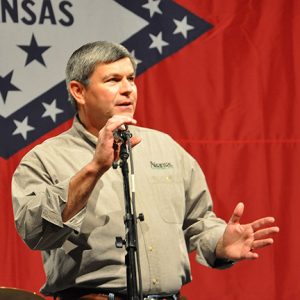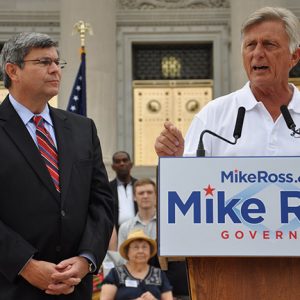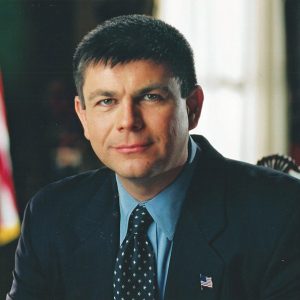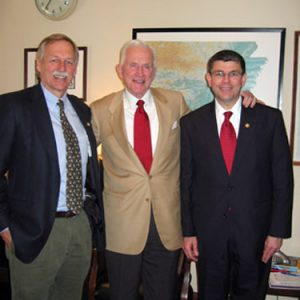calsfoundation@cals.org
Michael Avery (Mike) Ross (1961–)
A native of southwestern Arkansas, Mike Ross served six terms in the U.S. Congress from the Fourth Congressional District spanning the southern portion of Arkansas. Even as voters in his district became hostile to Democrats, Ross was able to maintain popularity in the district through a conservative persona and voting record. After leaving Congress in 2013, Ross became the Democratic nominee for governor in 2014. He was defeated soundly in an election cycle that marked the culmination of a sea-change toward Republican dominance in the formerly Democratic state.
Michael Avery Ross was born in Texarkana (Miller County) on August 2, 1961, to Gene and Frances Ross, who were both public school educators. The family lived in a variety of towns in southwestern Arkansas during the first decades of his life. He graduated from Hope High School in Hope (Hempstead County) and then went on to the University of Arkansas at Little Rock (UALR), where he worked his way through his undergraduate program in political science as a radio announcer. He ultimately settled in Prescott (Nevada County), where he and his wife, Holly Hempen Ross, owned and operated a pharmacy. The couple had a daughter and a son.
Ross got his start in the world of politics as the driver for Bill Clinton in 1982, the year Clinton successfully regained the governorship. Ross’s first political success was in being elected to the Nevada County Quorum Court, where he served from 1983 to 1985. After serving as chief of staff to Lieutenant Governor Winston Bryant, Ross was elected to the Arkansas Senate in 1990, where he served for a decade.
In 2000, he entered the race for the U.S. House from the Fourth District against the incumbent, Congressman Jay Dickey. Ross faced three opponents in the Democratic primary, but he led the first primary vote and easily defeated broadcaster Dewayne Graham in the runoff election. His campaign against Dickey seemed doomed when the national Democratic Congressional Campaign Committee pulled resources from Ross’s race in the stretch run of the campaign. The tides turned in his favor, however, when President Bill Clinton—who had been barred by Vice President Al Gore from making campaign appearances on behalf of the Gore-Lieberman ticket elsewhere in the country—barnstormed the district in the closing weeks on behalf of Ross and against Dickey (who had voted to impeach the president). Ross eked out a 51–49 percent victory over Dickey.
During his time in the U.S. Congress, Ross positioned himself as a leader of the Blue Dog Coalition, a group of fiscally conservative Democrats in the House. The ideological gap between Ross and the progressives in his party became most visible during the lengthy debate over healthcare reform early in the administration of President Barack Obama. Although he ultimately voted against final passage of the Affordable Care Act, Ross cast a key vote in 2009 on the Energy and Commerce Committee that allowed a Democratic healthcare bill to move to the floor of the House for consideration. As a result, Ross was later criticized both by opponents and supporters of the legislation for his votes during that landmark debate. Ross also cast conservative votes on a variety of social issues while in Congress. For instance, he consistently received an A+ grade from the National Rifle Association.
While Ross faced limited electoral opposition during his congressional career, he faced a surprisingly tough race in 2010, a particularly challenging cycle for all Arkansas Democrats. Ross ultimately prevailed by almost eighteen points in his contest against Republican Beth Anne Rankin, but the energetic opposition placed him in a more tenuous position in the district. In redistricting following the 2010 Census, the Democratic-controlled state legislature provided Ross with a more favorable district. But he retired in 2012 to pursue a private sector position with Southwest Power Pool in Little Rock. He also publicly announced that he would not seek the Democratic nomination for governor in 2014.
After a personal scandal forced Attorney General Dustin McDaniel to leave the gubernatorial race in early 2013, however, Ross reconsidered and entered the race in hopes of succeeding Governor Mike Beebe in April of that year. Ross’s successful fundraising meant that he faced only token opposition in the Democratic primary, and he seemed strongly positioned against Republican Asa Hutchinson. In the campaign, Ross emphasized his support for maintaining the “private option” Medicaid expansion program, expanding early childhood education in the state, and middle-class tax reform in Arkansas.
Despite record fundraising by Ross, Hutchinson maintained a small lead throughout the campaign and ultimately defeated Ross 55.4–41.5 percent; Ross won only twenty-three of the state’s seventy-five counties. The defeat of Ross signified the wholesale change in the state’s electoral politics during the Obama administration. Following the defeat, Ross returned to his governmental affairs position at Southwest Power Pool.
For additional information:
Barth, Jay, Janine Parry, and Todd Shields. “Arkansas: Nonstop Action in Post-Clinton Arkansas.” In The 2000 Presidential Election in the South: Partisanship and Southern Party Systems in the 21st Century, edited by Robert P. Steed and Laurence W. Moreland. Santa Barbara, CA: Praeger, 2002.
“Michael Avery Ross.” Biographical Directory of the United States Congress. http://bioguide.congress.gov/scripts/biodisplay.pl?index=r000573 (accessed November 18, 2020).
Mike Ross Congressional Papers (Unprocessed). Special Collections, Ouachita Baptist University, Arkadelphia, Arkansas.
 Divergent Prosperity and the Arc of Reform, 1968–2022
Divergent Prosperity and the Arc of Reform, 1968–2022 Politics and Government
Politics and Government Mike Ross
Mike Ross  Ross and Beebe
Ross and Beebe  Mike Ross
Mike Ross  Snyder, Broyles, and Ross
Snyder, Broyles, and Ross 



Comments
No comments on this entry yet.